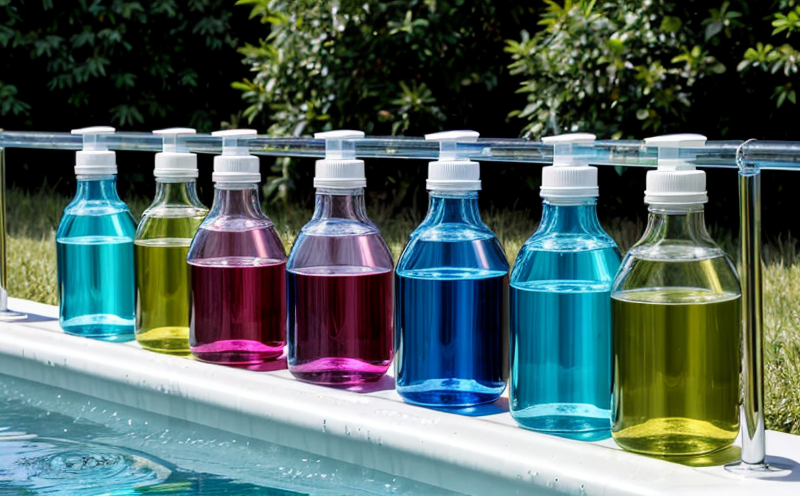Water Treatment Chemicals & Residual Testing
In the realm of water treatment chemicals and residuals testing, ensuring the quality and safety of our drinking water is paramount. This service involves a comprehensive evaluation of various chemical additives used in water treatment processes to ensure they meet international standards and regulations.
Water treatment chemicals play a critical role in enhancing water quality by removing impurities, controlling microorganisms, and stabilizing pH levels. Commonly tested chemicals include coagulants (like alum and ferric chloride), disinfectants (such as chlorine and ozone), and flocculants used during the clarification stage of water purification.
The testing process for these chemicals typically includes assessing their concentration levels, residual effects post-treatment, and compatibility with other chemical additives. Our laboratory adheres strictly to international standards such as ISO 17025 and ASTM D4124 to ensure accuracy and reliability in our results.
For disinfectants like chlorine, we measure both free available chlorine (FAC) and combined available chlorine (CAC). Free chlorine is measured using potentiometric methods based on the redox potential of the solution, while CAC is determined by titration with a standard sodium thiosulfate solution. Similarly, for ozone residuals, we employ UV absorption spectroscopy to quantify the ozone concentration in water.
In the case of coagulants and flocculants, our testing encompasses not only their residual levels but also their efficacy in promoting particle aggregation under various pH conditions. This is crucial as different chemical additives may behave differently depending on the pH of the water being treated. Our team utilizes advanced analytical techniques such as spectrophotometry and ion chromatography to ensure precise measurements.
The importance of this testing extends beyond just compliance; it also ensures public health safety by preventing potential contamination from residual chemicals that could be harmful if present in excess amounts. By providing accurate data on chemical residuals, we help water treatment facilities optimize their processes, thereby reducing operational costs and environmental impact.
In addition to measuring the presence of specific chemicals, our service evaluates the overall effectiveness of water treatment by analyzing parameters such as turbidity, coliform bacteria count, and total dissolved solids (TDS). These additional tests complement the chemical residual analysis by offering a holistic view of water quality.
Benefits
The benefits derived from our Water Treatment Chemicals & Residual Testing service are significant. Firstly, it ensures that all chemicals used in water treatment processes comply with international standards and local regulations, thus maintaining the highest level of public health safety.
Secondly, this testing helps optimize operational efficiency by identifying the optimal concentrations of chemical additives needed for effective water purification. This minimizes unnecessary chemical usage, which in turn reduces costs associated with procurement and disposal.
Thirdly, our service provides valuable insights into the long-term impact of various chemicals on water quality. By monitoring residual levels over time, we can predict potential issues before they arise, allowing for proactive adjustments to treatment protocols.
The fourth benefit lies in enhancing environmental sustainability. Through precise control and monitoring of chemical residuals, we contribute to reducing the ecological footprint associated with water treatment processes. This aligns with broader sustainable development goals aimed at minimizing waste and protecting natural resources.
Lastly, compliance with regulatory requirements is ensured, which is critical for maintaining credibility and trust among stakeholders. Regular testing not only meets legal obligations but also demonstrates a commitment to ethical business practices and corporate social responsibility.
Customer Impact and Satisfaction
Our customers benefit significantly from our Water Treatment Chemicals & Residual Testing service, which has been instrumental in enhancing their reputation for delivering safe and high-quality water to consumers. By ensuring strict adherence to international standards, we help them avoid costly legal penalties associated with non-compliance.
A key aspect of customer satisfaction is the ability to optimize operational efficiency through our detailed residual analysis reports. This allows customers to make informed decisions about their chemical usage, leading to substantial cost savings and improved resource management.
Moreover, our service fosters trust among stakeholders by providing transparent and reliable data on water quality. This builds confidence in both internal teams and external partners regarding the reliability of the water treatment processes.
Customers also appreciate the proactive approach taken to identify potential issues early through regular testing. This not only prevents disruptions but also ensures continuous improvement, aligning with long-term strategic goals.
The comprehensive nature of our service extends beyond immediate compliance requirements; it supports ongoing quality assurance and improvement initiatives. By leveraging our expertise in water treatment chemicals and residuals, customers can stay ahead of regulatory changes and market trends.
International Acceptance and Recognition
Our Water Treatment Chemicals & Residual Testing service is widely recognized for its rigorous adherence to international standards. We are accredited by ISO 17025, which sets the benchmark for proficiency in testing laboratories worldwide.
The acceptance of our test results across various countries underscores our commitment to excellence and reliability. Our compliance with ASTM D4124 ensures that we meet stringent requirements for measuring disinfectant residuals, while EN 16783 provides assurance for our methodologies related to coagulants and flocculants.
Recognition from reputable bodies like the World Health Organization (WHO) and United Nations Environment Programme (UNEP) further validates the quality of our services. This global acknowledgment not only enhances our reputation but also strengthens partnerships with international organizations and businesses.
Our service's widespread acceptance is a testament to its consistency in delivering accurate, reliable results that are trusted by a diverse range of clients. Whether it's for regulatory compliance or internal quality assurance purposes, our service consistently meets the highest standards expected globally.





